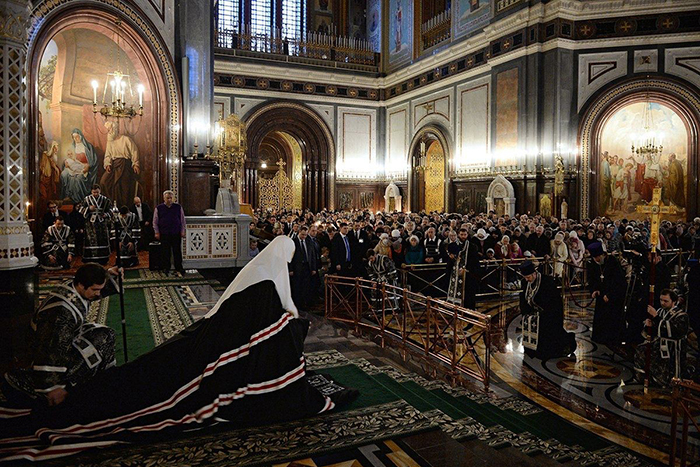
A Protestant friend asked me:
How can you pray the same prayers all the time? Isn’t it limiting and monotonous?
We’re certainly not expected to limit our prayer lives to liturgy and prayerbooks. The written prayers and songs of the Church don’t circumscribe my prayer life; they provide a foundation and jumping-off place for pouring out my own heart to God: a wider, more firmly-established launchpad than I’ve ever had before. The quality of my prayers no longer depends on my subjective eloquence or feeling on a given morning. Prayer becomes a daily act of faithful obedience to God, and it’s not so important whether I had a particularly fervent or satisfying time of worship and prayer. Since I am not the audience, the question I ask after prayer and worship isn’t, “How good was it?” but rather, “How did I do?”
In a way it’s nothing new to use the same prayers every day. For twenty years as a Protestant I always kept a list of ongoing prayer requests. And for most of my Christian life I have used the Lord’s Prayer as an outline to keep my prayers on track so I’d remember all the ways I intend to pray.
To my surprise, the more I prayed the same prayers daily, the more meaningful they became. An unexpected benefit of using the prayers of the early Christians is that, as these prayers become part of me, they are shaping the way I think and worship at all times.
G.K. Chesterton had this to say about repetition:
The recurrences of the universe rose to the maddening rhythm of an incantation, and I began to see an idea. A child kicks his legs rhythmically through excess, not absence, of life. Because children have abounding vitality, because they are in spirit fierce and free, therefore they want things repeated and unchanged. They always say, ‘Do it again’; and the grown-up person does it again until he is nearly dead. For grown-up people are not strong enough to exult in monotony. But perhaps God is strong enough to exult in monotony.
It is possible that God says every morning, ‘Do it again’ to the sun; and every evening ‘Do it again’ to the moon. It may not be automatic necessity that makes all daisies alike; it may be that God makes every daisy separately, but has never got tired of making them. It may be that He has the eternal appetite of infancy; for we have sinned and grown old, and our Father is younger than we (in Orthodoxy, pg 60-61).
Tito Colliander wrote,
Frequent repetition is important: with frequent wingbeats a bird soars high above the clouds; the swimmer must repeat his strokes countless times before he reaches the desired shore. But if the bird ceases to fly, it must be content to dwell among the mists of the earth. And close beneath the swimmer lurk dark and threatening depths (in Way of the Ascetics).
And Dr. Richard Schmidt wrote:
It takes 300-500 repetitions before a new movement is learned, but 10 fold (3000-5000 repetitions) to learn a new movement that has to replace the old (in Motor Learning and Performance).
Schmidt’s context is martial arts training — but this is very relevant to changing habits of thought and response.
It is the nature of water to flow effortlessly away. Yet what irresistible force cut the awesome Grand Canyon into the rocky surface of the earth? Drops of water, flowing continuously, over time. The fact that we prayed this morning may not make any visible change in us. But with perseverance each of us may become a person of prayer.




